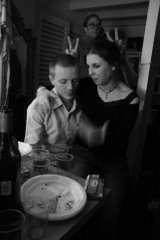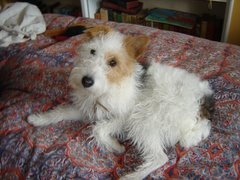Woke up at 7. Olivia was roaming about, insomniac because of the heat. Dark clouds looming overhead and insufferable humidity: looks like the rainy season is imminent. We packed up and saw the rest of the family gradually emerge. We had a bucket shower and breakfast of bread and Nescafé. Tarim Toubé was going on his way to work and had told us that he would drop us off at the bus station. We picked up one of his friends who worked for the Senegalese gas company. This was something he seemed to be doing for the first time judging by the look on the friend’s face. We suddenly realised that we were being shown off, a little hike in his prestige the reward for his generosity. This seemed fair enough so we lavishly and truthfully praised our host for his hospitality, generosity, and the splendour of his house and family. We all parted in a good mood.
We needed to go to the bank as these get more scarce apparently over the border, and waited until it opened at 8. Waiting for Olivia, I watched the queue for the
After the bank we stopped for breakfast (again) on the way to the bus station. We sat at a big round table under a straw roof. We ate a dish made of beans wrapped in bread and I had my first cup of “café touba”. This is bitter, thick and smooth and even with a lot milk tastes overwhelmingly of cinnamon, it warms and lightens the insides.
We found an empty “sept places” going to Kidira (9400 each), the town on the Senegalese-Malian border,
*
It’s now nearly eleven and the countryside is getting greener with more grass, shrubs and trees. It’s really beautiful. Should be at the border in about 3 hours. Insh’Allah!
*
I dozed, with music pumping from the stereo. We reached Kidira at about 12.30, unloaded the car, and handed our passports to the grinning officials. No problems whatsoever. Olivia, Denis, one of the youths and I then took a cab to drive across the border (we’ve made it!), and got out to walk 300 meters to Malian customs. These were in a square concrete building at the end of a small street that crossed a village. Inside, a half naked man was handcuffed to a bench. Olivia, Denis and I paid 1000 FCFA “customs duty” each, which the official pocketed with a smile. The other guy however seemed to have a problem in that he didn’t have a passport, and had a phoney date of birth on his identity card. I hope he doesn’t end up chained to that bench as well.
We walked back to the main road of Dibouli, the village on the Malian side, and are waiting for our new vehicle to fill up. This time it’s a baché, a cross between a van and a 4x4. The driver and two passengers sit at the front, and a kind of trailer is attached to the back. It’s made of wooden slats and has a bench running round it, the floor and roof are made of corrugated iron. After a short wait it has filled up rather a lot: 16 people so far.
*
It didn’t help that on the baché’s floor were two massive spare tyres, buckets and a large bag of rice. A thin iron rail stops anyone falling out of the back and it was as squashed full as it was possible to be. Among the passengers: a turbaned man that looked like a desert nomad Touareg in his long indigo-blue robes; a mother holding her screaming child, five young men with another ghetto blaster stereo, and a large man with the worst skin disease I have ever seen. Half his face was rotten with shiny red flesh poking out from huge scabs; he looked like he’d been eaten by insects. He was also extremely jovial and beamed at the heap of people around him. Actually, it was he who started booming at the driver about the buckets and rice and spare tyres occupying the floor; he bellowed that we were not sardines. One tyre, the rice and two buckets disappeared on to the roof, and three other people promptly got on. One must insist on the fact that this trailer was only 1.50m x 2.50m and with a 1m20 ceiling.
That’s when the goat arrived, accompanied by its young mistress, a cheerful 20-something year old girl. From the cries of the others we understood that the goat was supposed to be travelling with us. “Mais il va uriner partout!”, bellowed the massive flesh-eaten man, so instead the goat was unceremoniously dumped in to a large bag, wrapped up to its head, and tied to the roof. At last we set off, squashed and bouncing on the awful roads, the goat screaming the whole way.
After about 150 meters we were stopped. The police wanted everybody’s passports, except for us three “toubabs” (white men). The others were led off to the official hut by the road, and depending on their nationality paid 1000 or 1500 FCFA. The Mauritanians pay more as they are disliked for still practising slavery on the Senegalese and Malians according to one of our fellow passengers.
This time we were off. The mother and child had now moved to the front, a couple of guys had gone on to the roof next to the bawling goat, another was balanced on the metal bar at the back, the goat-girl was sitting on the spare-tyre. Denis and Olivia were opposite each other at the back looking back at the fleeing road and countryside, I was next to Denis and squashed in to the flesh-eaten man, terrified of contagion. Everyone was very cheerful, we all burst out laughing whenever the poor goat bumped and screamed. The countryside was green, like an endless forest clearing of grass and lonely bushes, scattered baobabs. The road itself was appalling: a wide, red gravel track covered in orange dust. We bounced along. Bounce Bounce Bounce. Baaaaaaaaaaaa. Guffaws. Music blared from the stereo. After about two hours of feeling stiff, we stopped at a little village; the mud houses are square here rather than round. We were covered in orange dust which made us look badly fake-tanned. Everything was covered in dust, it got under the seats, between the toes and teeth, in our bags and water, our eyes and the creases of our clothes. We swapped seats around a few times to get new muscles to ache, and for a long while I dangled out the back, sitting on a metal rod, my feet skimming the air. Became fluorescent orange.
We stopped again for hibiscus juice, a taste of cranberry and peppermint. It comes frozen, in knotted little plastic bags. One simply bites off a corner and slurps it out. It is the most refreshing thing I have ever tasted. The mood was light all the way to Kayes. When we got near the town, we turned down the stereo which had been belting out Malian drum and bass. Soon enough, officials came to look at our passports, gawping with amazement at the difference between our passport photos and grubby reality.
Now, the problem with the baché depot just outside Kayes is that it only has one cab, and it certainly charges monopoly prices. We three toubabs, in search of a place to stay that night, tried bargaining to get to the “Marché” area of town, but the guy knew that without him we were stranded and refused to budge on his asking offer of 2500 FCFA, making noises about it being 7 km away and needing two litres of petrol to get there. In the end we gave in and entered what was truly a horrible vehicle. All cars in Senegal were fucked: cracked windscreens, no mirrors, windows blocked open or shut, no door handles, or just pieces of string where they should be, spluttering engines. This one didn’t even have an ignition. When he had wired it to start, thick black smoke and carbon monoxide started pouring in to the back from the boot where the engine appeared to be. With shut windows it was an asphyxiating drive.
The room we’re staying in is huge, empty except for two foam mattresses and a ceiling fan. There is also running water and I had my first blissful shower in
*
I woke up this morning to the simultaneous sounds of pouring rain and Olivia screaming “C’est trop la merde!!” We’d overslept; didn’t even hear the alarm in fact; it was 6.15. Olivia hadn’t repacked, and I was drooling with fatigue. She got Denis up (yes, he too was coming to
*
We were meant to leave at 7.15, but this is African time. The guards are wearing long yellow raincoats that make them look like Paddington Bear. At the risk of having the train leave without me, I went off in search of breakfast. Next to the station behind a stone wall and beyond a huge swamp was a little stall flanked by long tables. They were making fresh, hot omelette sandwiches, which I got with some coffee made with Nescafé and sweet condensed milk. The protein was great. The platform was not very busy because of the rain, though it was still lively: kids were selling water, women breastfeeding in a circle, a small child sitting on his potty. The guards saw us and burst in to hysterical laughter. They also said that we would shortly be leaving. That was 45 minutes ago. It’s
*
We’ve just left; it’s
*
We’ve just gone through Mahina where we stopped for a bit. The countryside all around is spectacular like a green
*
Around
Just as we got back on the train the mother of all storms started. Our train is actually an old French one, complete with the French railway maps between carriages. It is completely unadapted to the climate: only the top part of the windows open, making it sweltering, and more often than not they are actually jammed open, allowing the rain to dribble in. The storm was brief and violent. Afterwards the air felt fresher and I stood on my seat, my head hanging out of the window. The whole sky is black on black: spongy velvet storm clouds on a night sky as sharp as glass. Outside a forest is illuminated by frequent flashes of lightning. We are travelling a lot faster now and it is truly exhilarating; the train is like an animal bolting for shelter from the elements.
*
We raced over bridges, over swollen streams and at one point became level with the top canopy of the trees.
*
It turns out it wasn’t someone taken ill at all, it was a corpse found on the rails or in the train, we couldn’t understand which.



Aucun commentaire:
Enregistrer un commentaire